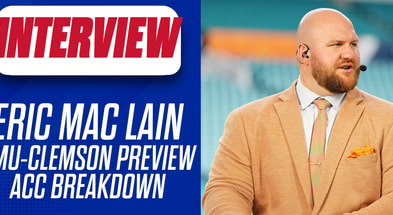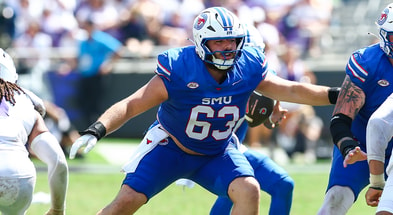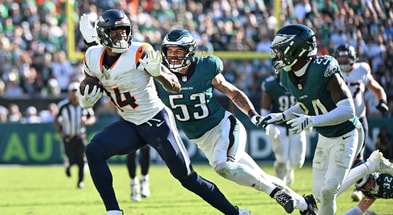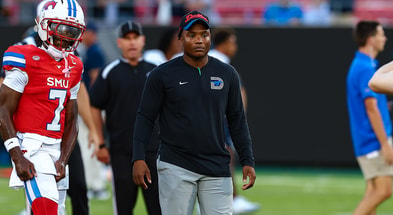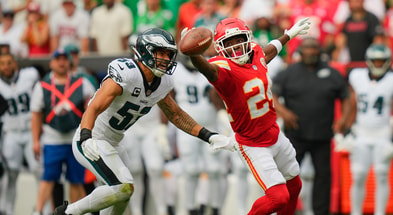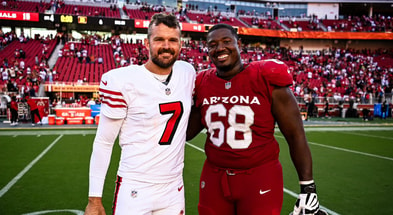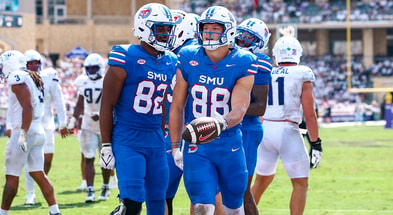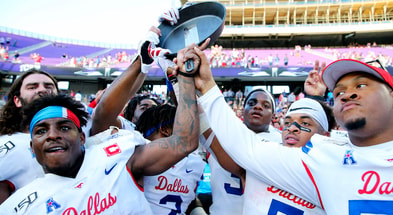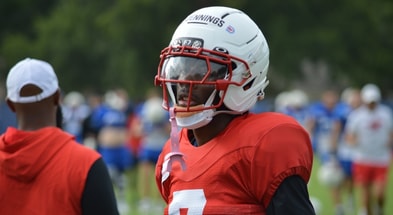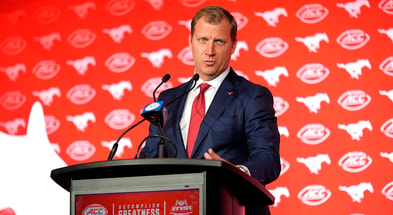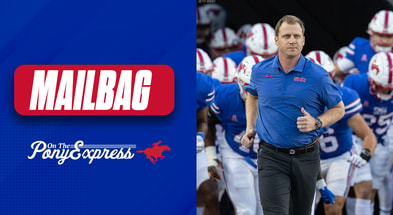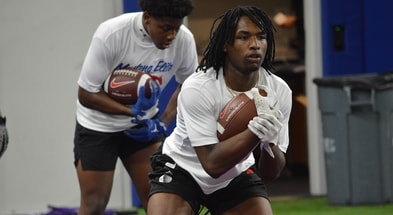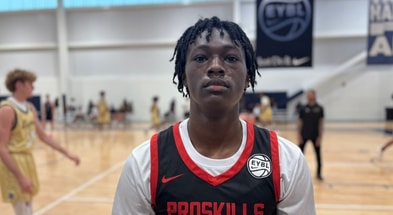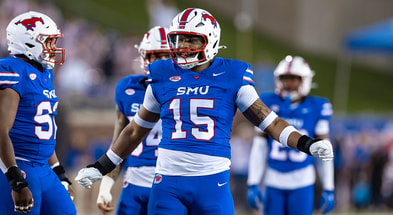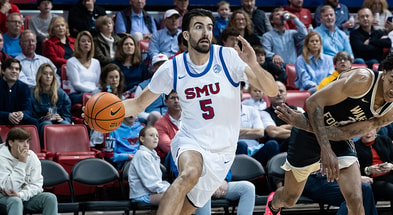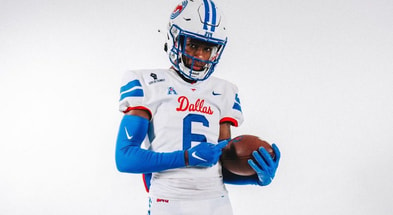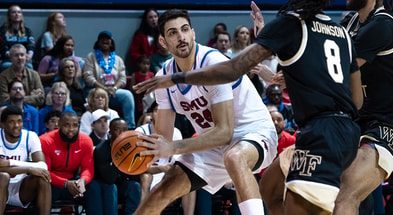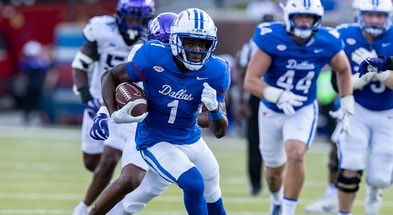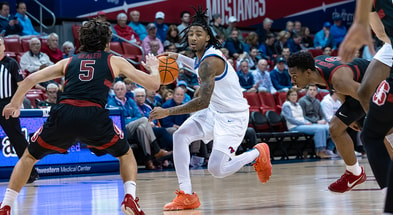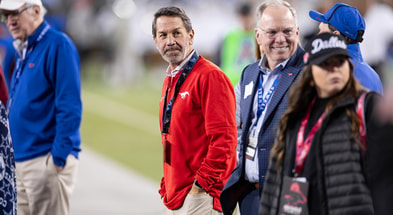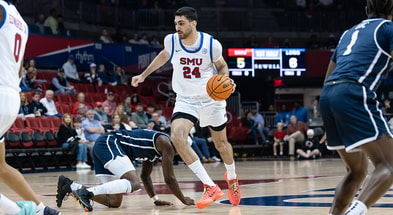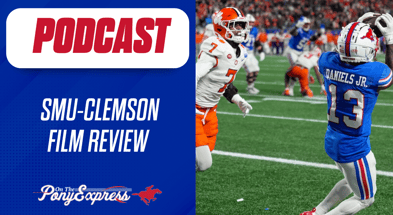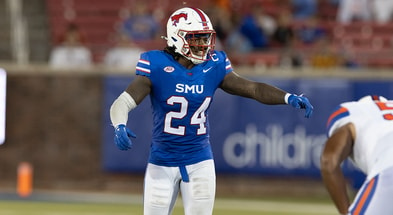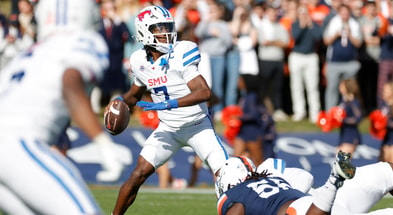Everything Rhett Lashlee said ahead of SMU vs Penn State

Rhett Lashlee spoke to the media on Tuesday, previewing SMU vs. Penn State. Here is what SMU’s head coach said:
Opening statement: “Yeah, excited to be game week, you know, it’s kind of nice that the game falls on Saturday, so we treat it like a normal game week in terms of our prep. Excited to be one of 12 teams remaining in the playoffs and mid-December playoff football, first time for college football, so pretty exciting and our guys are working hard to be ready to go up and compete.”
On trying to simulate the environment for Saturday: Yeah, I mean, we’ll do the best we can. We went indoors and cranked up the noise for half of practice for the offense. You do the best you can. Fortunately, we’ve not been in this environment, and so we’ve had some good environments. Even the championship game a week ago was helpful, but there’s really nothing you can do to prepare for it. You just gotta get there, you gotta adjust to it and go compete. So we’re doing all the normal things you do to try to prepare, but obviously it’s a huge home-field advantage and that’s why they earn the right to be at home.”
On preparing for the cold weather: “Yeah, I’m disappointed we had a really nice day today. Leading up to the game in Charlotte, we had cold days, which we go in the morning, so we were able to practice in the 30s and 40s, and I think that helped us. I don’t think the weather was an issue in Charlotte when it was around 35, or 37 [degrees] when the game ended. I think our guys handled it great. This is going to be different, probably 25 or somewhere around there, and I don’t really know. So no, here’s the deal. They’re playing in the same weather we are. They’ve got to play in it just like we do, and I don’t think they’ve played a game on December 21st at home before, either. I don’t think the weather’s a big deal. Both teams are playing in the same conditions, whether there’s snow or not snow, whether it’s really cold or just kind of cold. It is what it is. And like we told our guys, I know our guys do, and I know their guys do, aspire to play in the NFL. They aspire to play championship playoff football, which we’re getting to do right now. Well, this January, guess what? The playoffs are gonna go through Arrowhead in Kansas City, and they’re gonna go through Buffalo, and they’re gonna go through Lambeau. Just like they do most years. And you’re either on one of those teams if you’re in the playoffs, or you’re playing one of those teams. And the best in the world do it. And I know the Chiefs last year had that game that was like 10 degrees or whatever. And Rashee Rice, who played here, didn’t like cold weather. You know what he did? He went out and played really well. And so our guys have to do that. The weather is only gonna be an issue if we allow it to be an issue. So we know it’s gonna be really cold. It’s gonna be really cold for them as well. So it’s our 11 vs their 11, and that’s gonna decide the game.”
On the SMU vs. PSU matchup being the CFP first-round only game with two QBs who committed to their current school out of HS: “I didn’t know that, that’s a good stat. So we’re the only two teams that have the quarterback, went to that school in the state, and that’s – For this first round. Okay. Obviously, we’re excited for Kevin to be a Dallas high school player who came here and has been here for the duration, and that’s really special. I think that’s cool. We had had a couple of years where we had great transfer quarterbacks, and now we’ve gone on a streak of a couple of years where we’re playing with the high school players we recruited. Drew Aller, I remember when he came out, he’s a big, strong, NFL-armed kid who has played really well for them. And so it’s not the norm anymore, to your point. So, it’s neat. You know, I think what’s really cool, and I know it’s not to your question, is the two teams from the ACC that made it into the playoffs were playing with Texas high school quarterbacks. And I think that just shows the coaching in the state of Texas and what the Texas high school coaches do. That’s why we take a backseat to no one with our high school coaching in the state. And then, you know, us and Texas are in the playoffs. So two football teams from the state of Texas made the playoffs in the first year. I think all that’s really cool. And it just shows you why high school football is the best in our state.”
On how to handle the physicality of the extra games: “Yeah, I mean, you know, your bodies are all beat up. All teams and staff are pretty much on empty right now. But, I mean, if you’re one of the 12 teams that’s in the playoffs, you get a boost of adrenaline that will carry you. I mean, I think, I know I can speak for our team, and I’m sure Penn State and the other ten teams feel the same way. Just, you’re in the playoffs. And it’s no different than the NFL teams get to do it. And they play 17, 18 weeks. And then if they make the playoffs, they find a way, right? I think we did a good job getting our guys through the season. We talked a lot about how we’re gonna play 10 Power Four games. Never done that. We ended up playing 11, cuz we got the bonus game. And our guys went, what, nine and two in that window? So they did really well physically. And I think the way we were able to handle the off weeks, but also when we had maybe the second, third, or fourth game in a row, we would take some things off and practice much like what they do in the NFL from the physicality standpoint. And try to get them to game fresh. So I think Coach Grizz does a great job in strength and conditioning. I think our guys and our staff have handled it well. We didn’t implore anything different preparing to be in the playoff. Because one, you don’t know if that’s gonna happen. And two, when you get here, I think the reality of that you’re in the playoff kind of takes care of that for you.”
On what is wrong with the transfer portal and potential ways to fix it: “Not this way. I mean, it’s terrible. I feel so awful for our kids and kids around the country. You know, we talk about making a system that is all great for them, but we haven’t. I mean, that’s part of your job as adults is to do what’s best for young people, not what they want necessarily. And they don’t want this. Yes, they want the ability to transfer and go where they want to go if they don’t like their situation. Yes, they want the ability to make money on their name, image, and likeness. Neither one of those are bad things. There’s no other sport at all that has free agency in the season. It’s sad. It’s terrible. You hear the story about their quarterback saying, I don’t have a choice. That’s wrong. That’s unacceptable. That’s not okay. He shouldn’t have to make that decision. Preston here is doing the same thing. Now he has chosen to stay with us and we’re working with him, but it’s still a juggling act for him. Oh, and let’s not forget they’re in finals right now. So yeah, the really easy thing is you don’t have a transfer portal in December. That’s a really easy answer. And it solves all the problems. Like why in the world would we put kids in a position where they got to decide, do I transfer or play in the playoff? Do I transfer or play in my bowl game? And scholastically, it doesn’t make sense either because your years end in May, not in December. And so we gotta look long and hard at the schedule. Coaches have been saying this for the last three or four years with all these changes. And what happens is we just make all these random changes because we don’t wanna get sued or we don’t wanna do this and we don’t wanna do that. And we don’t think about the long-term effects it has on the young people that we’re supposed to be serving. So I hate it. I hate it for our players. I told them that Monday. I hate that you guys get a chance to play in the college football playoff, yet you are either forced to decide do I go in the portal or not, or, let’s call it like it is, people are bombarding our roster, trying to pick people off our roster, and we’re trying to focus on the playoff. Oh, and they got finals. Oh, and it just goes on and on and on. So, yeah, it’s really easy. You don’t have a transfer portal in December. Yeah, go to the spring. And we need one portal window, and we need to look long and hard at what’s best overall for the young people that it affects and that it’s supposed to benefit because right now there are too many issues that don’t give them the true benefit they deserve. So I would say sometime in the spring is best. And then we probably need to look at going into an NFL model and spring ball. How about we have OTAs after the portal closes like they do after the draft? But long and short of it, the easy answer is don’t have free agency, don’t have a portal window. And put kids in a position where they have to either make those decisions or be incredibly distracted by the environment.”
On the importance of retaining Kevin Jennings: “Yeah, it’s really important to us and to him to have someone who’s already, I see preseason Heisman watch list and all that stuff for next year. We’re not even done with this year, but it’s big for our program. It’s big for the continuity and consistency here. I think it’s big for him. He wanted to be here. There was never a doubt about that. Again, same thing, it’s unfair that he has to be figuring that out between the end of a championship game and a playoff game. It is what it is. And so we all, as coaches and adults, we’re easy. We can adapt. You make the system terrible. You make the rules hard. You make it not probably flow the way it should. We can fix that, but it’s the kids that aren’t. They shouldn’t have to deal with that. But glad that he always wanted to be here, never wanted to be anywhere else. We were able to make that happen, and he was able to put that out there. Gets that off his shoulders, I know, too.”
On lucky he was to watch Jennings in his first HS game he watched as SMU HC: Very, very [lucky], because I got hired on a Sunday night, talked to the team on a Monday morning, and I didn’t go recruit at all, Monday, Tuesday, Wednesday, or Thursday of that week, which normally you would. But at that point, it was the first year of a portal at that point in the season, right? And so I was trying to keep our roster here intact. And it was like, okay, you got to go somewhere. And everything happens for a reason, the timing was right. And it ended up the way it was supposed to. Kevin was meant to be here and be our quarterback, and we’re really glad it worked out the way it did.”
On how coaches handle allowing players in the transfer portal to continue playing for their current team: “Yeah, no, I think it’s different. I think every situation is different. I think if you had a kid who had been contributing and starting and all that and then decided he just wanted to leave, that you didn’t want to leave, then it would be different. But if you have some, whether you call it walk-on players or maybe third team, fourth team players that go, coach, I want to be here, but I do want to play. So I’m going to put my name in the portal to go somewhere else where we can play and we’re going to help them. But I would love to finish through this deal. That, to me, makes sense. Even in a deal like Preston’s, like Preston’s given everything to this place. He’s graduating this month, or this weekend, I guess. And for what he’s done, and he said, he was adamant, he’s like, no, no, I’m finishing. Like I want to finish if you’ll let me, and I’m like, of course I’ll let you. And I get it, it’s hard if you’re a coach. Do you let people who are leaving finish and all that? Again, every situation is different. But I think just doing right on an individual basis by the young man is the right thing to do. And we’re not trying to create problems where there don’t need to be problems. So we work with them. They can’t miss what we need to get ready for the game. But like if, hey, we have two days where we’re not practicing, and they can take a visit somewhere, then so be it, right? And that’s just kind of how we’ve handled it here.”
On limiting Tyler Warren: “Yeah, well, I don’t know if you defend him. I think you try to just contain him and slow him down a little bit. He’s gonna get his. I mean, he’s a matchup problem. If you play man, he’s definitely a matchup problem. We had that with RJ Maryland in some ways. If you play zone, he’s still a matchup problem because he’s so big. And all of the zone [coverage] becomes man once the ball’s in the air anyways. And whether you have one guy or two guys on him, they do a really good job of moving him around, he plays a bunch of different places. So it’s kinda like when we had Rashee Rice, he was gonna get his catches. And so obviously, we hope that we can keep him from being touchdowns and explosives, but he’s special. There’s a reason he won the Mackie Award, and he can do all the things he can do. And he’s got a big-time NFL career ahead of him. So we definitely gotta be aware of where he is. Rarely do you see a tight end where the offense kinda runs through him. And to some degree, that’s what they do with him. So I don’t think we’re gonna stop him by any means, but maybe we can make it hard on him, maybe we can slow him down. Maybe we can keep him from just totally dominating the game and try to make some other guys have to make some plays.”
Top 10
- 1
College Football Playoff
The eye test for top teams
- 2New
Deion Sanders
Colorado demotes OC
- 3
Dabo Swinney
Refs need to answer for mistakes
- 4Trending
CFP Top 25 revealed
The official rankings are in
- 5
Notre Dame
Committee leans on feeling over data
Get the Daily On3 Newsletter in your inbox every morning
By clicking "Subscribe to Newsletter", I agree to On3's Privacy Notice, Terms, and use of my personal information described therein.
On the development of the defense over the course of the season: “No, the defense for us has been rock solid all year. We’ve all known that and talked about it. I think a lot of guys did return from last year, but we did have plenty of transfers, particularly on the D-line, come in. And they did a really good job conforming to the defensive culture that had been established by some of the older veterans, the Jonathan McGills, the Kobe Wilsons, the Elijah Roberts, and so on. So I think it’s been a special group. I think it’s all started up front with our D-line, both in the run and pass game. And they’ve given us a chance every week we go out. And so I think you can see over the last two years how our program has shifted and changed with the emergence of a real defense. And so I think that’s why it was a big deal that Scott Symons is sticking around and hopefully everybody on that defensive staff. Because just like as a player, there’s not a lot of substitute for experience. Well as a staff, there’s not a lot of substitute for the continuity that we have. There’s a lot of confidence on that side of the ball. It’s come from the success that they’re able to have. But the couple of guys that came in did a nice job of buying into the culture of what we do here. And it’s always special as a coach when you see guys come in and buy into what you ask them to do, and then it translates to success. And so that’s been good to see.”
On trying to get off to a fast start: “Yeah, thanks, Andrea. I mean, it’s really important. I mean, we always want to get off to a fast start, but I think more than anything, we just can’t get off to a slow start, you know, we’ve talked a ton about what we did in the first quarter against Clemson put us way behind the eight ball there. But you know, I think the first quarter is big because starting fast is important in football games anyway, and now we’re on the road 106,000 plus. The atmosphere is going to be electric. They’re going to have all the momentum and adrenaline behind them, and so it’s going to be important to start fast, but also just hang in there and kind of get through that initial surge once the game starts and be, you know, in a good competitive game to where then we could settle down and then it truly is just 11 on 11, and we can go play football and see how we stack up. So I think it is important for sure.”
On Abdul Carter and the problems he presents for SMU: “Abdul Carter is the best defensive player we played in my time at SMU, based on the film I’ve seen. So he’s a problem. And the thing is, he’s not the only problem on their defense. They’re really good on defense. The other couple of defensive ends are really special. If they didn’t have Abdul, we’d be worried about them. We are worried about them, but Abdul is so dominant. Their team speed stands out on defense. So you watch like last year he played more linebacker. So you watch a game from last year and you see him at linebacker and he’s just incredible, he’s physical, he flies around and makes plays. And then they moved him to defensive end this year, and he’s got as good a get-off as anybody in college football. There’s a reason he’s a top-five, top-ten pick in the upcoming draft. And on top of it, our tackles have to deal with the noise of trying to hear the snap count. And so there are a lot of things in his favor that he doesn’t need on top of the fact that he’s just probably as talented of a pass rusher as there is. But that’s not all he is; he’s an all-around player. And what really stands out to me is his motor, he plays the game the right way. You got a lot of respect for how hard he plays. He’ll chase down plays from the backside. So just like we got issues with Tyler Warren and a lot of other guys on their offense, we’ve got work cut out for us on their defensive front and really their overall team speed on defense.”
On the emergence of Matthew Hibner: “Yeah, I mean, we thought he was this kind of a player. I thought Coach Woods did a good job identifying it and, you know, identifying him as a good fit. And then, fortunate for us, he chose us and came here. We always felt like he was an all-around, every down player, you know, and that he could really help us in the run game where we needed a boost, but also could still make plays. And, you know, probably the first four or five games of the year, we were trying to figure out who we were offensively, obviously the quarterback situation, but even there. And, you know, R .J. was playing a little more tight end like he had done, and traditional tight end, per se. And, you know, Matt was also getting acclimated to us and who we are and what we do on offense. But we always kind of envisioned those guys on the field together in a perfect world and really that’s what we had started doing around the Florida State game around the Louisville game around the Stanford game when he got hurt when RJ got hurt is that you know Matt was playing the more traditional tight end and RJ was playing more the flex tight end and that allowed us to have both of them on the field which gives you a lot of versatility and they have different skill sets but you know when RJ went down we had already kind of transitioned Matt to that role it just changed maybe then obviously we didn’t have them both to be on the field at the same time so it maybe limited some of the stuff we could do in personnel packages but you know Matt started playing that way you know once we started making that transition even shortly before RJ got hurt and I think he’s just shown he’s very reliable pass catcher he can run you know he made a great back shoulder touchdown catch the other day in the championship game on the seam ball and he’s obviously still very effective in the run game. So Matt’s just a great all-around player and we’re excited about him coming back next year because I think he’ll continue to build on what he’s done this year and show that he’s an all-around threat as a tight end that I think is going to play at the next level.”
On facing Penn State’s stellar rushing attack: “Yeah, we have a challenge. When you run for 300 yards on Oregon, you’re pretty good. And I remember recruiting Kaytron Allen when we were at Miami when he was coming out of high school, he was big physical back. Both those guys have done a really nice job for him. And they complement each other with that one-two punch. I think what they do on offense so well is, and I know there are OCs who talked about it, it’s kind of what I grew up under Gus Malzahn learning the philosophy of look we’re gonna do what we do you know they end up running the same couple of run plays over and over it’s just they window dress it and get to it a bunch of different ways. And so whether they shift in motion or give you unique pictures to still run you know inside zone or counter stretch or whatever the run plays are to them they’re running the same plays over and over again but to defense, they’re presenting different pictures and I think that’s what good offenses do and so that’s the challenge it’s one thing to say okay we got to stop really good players with a really good O-line and they have a big-time tight end that can hurt you in play action and a quarterback, etc so it’s hard to just sell out to the run that’s hard enough but then when they’re going to give you different pictures they’re going to move and shift and do all the things they do to just gain a slight advantage here or there makes it even tougher. But that’s the assignment, this game is gonna come down to the same thing most of our games have come down to. The more physical team that can win the run game, the team that can value the football and the turnover margin, and the team that can be the most explosive or limit explosives usually is gonna win the football game. And this is gonna be no different. So we gotta find a way to slow those guys down and not let them just control the game flow at all times with what they wanna do on offense.”
On the importance of keeping Preston on the team for the CFP: “Yeah, I mean, it’s huge. You keep some continuity. As we all know, Preston has played a lot of football and won a lot of games. That’s been a big deal for us all year. even at Louisville, when he went in at one play, it was a touchdown pass. So, we do have Keldric Luster, who we have a lot of belief in. I mean, we think Keldric is more than capable of going into the game and playing winning football right now. We expect that to be the case next year as well. So, to have the experience that Preston brings is definitely a positive for us in the event that we have to turn to our second guy, just because this environment and the stage that we’re getting to play on is not your week two home game stage. So having that experience is definitely a plus for us.”
On how much the past players and coaches have helped SMU get to this stage they are currently at (including Sonny Dykes): “Yeah, I don’t think it’s divisive at all. I think Sonny Dykes deserves a lot of credit for the part he played in our program getting to where it is. I said this over the last couple of years at different times, in different ways probably that I’m just blessed to be the coach at this time. But I’m benefiting in our program now and our staff has been benefiting from a couple of decades of hard work. I mean, you look, whether you’re talking about Forrest Gregg, right when we brought the program back. But more recently, like June Jones, I think, came in here and for the first time started winning. And had some winning seasons, had some fun offenses, had some NFL players, the Emanuel Sanders, the Cole Beasley, those kind of guys. And then, Kelton Beechams, and then on top of that, went and won a bowl game. And so, he took our program to a step kind of that we hadn’t been to in a while. the process, right? You know, Chad Morris comes in and creates a buzz about recruiting and brings kind of that top-level recruiting mindset to the school that hadn’t existed, right? And so that kind of helped a little. And then Sonny came in, which I was allowed, that allowed me to get here. And I’m grateful that he hired me. And you know, in our second year we won 10 games. That was another thing we hadn’t done since before the death penalty. And then, you know, I think that’s also when we started embracing the city of Dallas and the triple D and all the things that we wanted to do and realize that’s when the portal became a thing. And so, okay, well, if we’re not in a power conference, how can we get power conference-level players here to compete at the level we want to? And so I think it all just has added up. I’ve said before that it’s like a pickle jar effect. They all were trying to get the lid off, and they never got it off. But by the time we got here, we were able to pop the lid off because a lot of work had been done by so many before. So, and that’s just speaking from a long coaching standpoint, not to mention all the greats and alumni from the Paul Lloyds to the Bill Armstrongs to David Miller to obviously Gerald Turner, has been kind of a consistent piece of that the whole time. So yeah, I think he played a great role. It’s part of our story and our journey over the last couple of decades to get us back to this stage where we felt like our program belonged. Be on the national stage and be in the college football playoff, be a nationally ranked top 10 team. And there’s 12 teams out of 134 or whatever we got that get to compete for a national title, and we’re one of them. I am so grateful for all the guys that came before and the work that they put in to help us. And I should say this: all the players that came before. So many players that endured not winning seasons to get our program back to here, yeah, this is for them too. All right. Thank you.”

